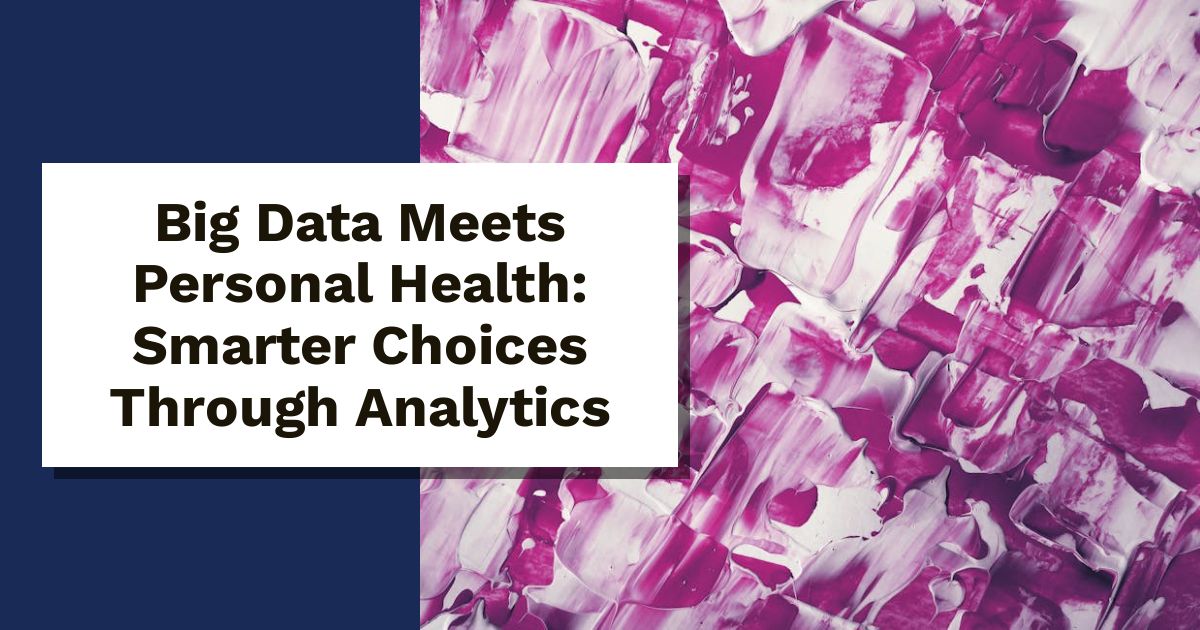What if your fitness tracker could do more than count steps? Big data is transforming the way we approach personal health, offering insights that go far beyond basic stats. From improving sleep to optimizing workouts, analytics can provide a clearer picture of what your body truly needs. By harnessing this data, self-improvement becomes less about guesswork and more about real, actionable steps. Ready to unlock your potential? Let’s see how analytics can help.
Understanding Big Data in Health
Big data is changing how we view personal health. It’s no longer just about routine checkups—data is giving us deeper insights into how our bodies function. From wearables tracking your every move to complex analytics revealing hidden patterns, big data is a key to maximizing health and wellness.
What is Big Data?
Big data refers to large, complex datasets that traditional methods can’t easily handle. Think of it as a massive vault of information, collected from countless sources, waiting to be analyzed. In the health field, this means everything from your fitness tracker stats to the results of clinical trials. The size and speed of this data make it invaluable for spotting trends, improving care, and tailoring solutions to individuals. Learn more about healthcare big data here.
Sources of Health Data
Where does all this health data come from? You might be contributing to it already. Here are some common sources:
- Wearable Devices: Activity trackers and smartwatches record steps, heart rate, sleep patterns, and more.
- Health Apps: Nutrition trackers, meditation guides, and fitness apps gather user-provided data on habits.
- Medical Records: Your doctor’s notes, diagnostic tests, and imaging results are part of the puzzle.
- Genetic Testing: Services like 23andMe collect DNA data for insights into ancestry and health risks.
- Public Health Data: Data from disease registries, health department reports, and surveys like the CDC’s BRFSS.
These sources are like puzzle pieces, coming together to create a full picture of your health. Explore common health data sources here.
The Role of Analytics
Data alone doesn’t mean much without analysis. Analytics turns the mountain of information into actionable insights. Imagine taking raw numbers from your fitness tracker and transforming them into advice tailored just for you. That’s what analytics does. It looks for patterns, identifies risks, and helps predict outcomes.
For example:
- Improving Fitness: Analytics can estimate the ideal workout intensity based on wearable data.
- Preventing Illness: It might flag early signs of health problems before symptoms appear.
- Customizing Treatments: Doctors can use it to fine-tune medications or therapies for individual patients.
Analytics bridges the gap between data and decision-making, offering a roadmap to better health. Dive deeper into the role of analytics in healthcare here.
Big data isn’t just a buzzword; it’s a tool for self-improvement. By understanding it, we can take control of our health and make choices that truly matter. Want better sleep? More energy? The answers might already be in the data you’re collecting.
Self-Improvement through Data
Using data for personal health isn’t just for scientists or doctors. You can take control of your health by tapping into valuable insights from numbers you already have. Let’s explore how tracking, setting goals, and monitoring progress can lead to meaningful self-improvement.
Tracking Health Metrics
Health metrics are like a report card for your body. They give you a snapshot of what’s working and what needs attention. Most wearables and apps track key metrics, such as:
- Steps: Simple, yet effective. Hitting a certain step count daily can keep you moving and boost heart health.
- Heart Rate: Your resting heart rate can reveal your fitness level and even indicate stress.
- Sleep Patterns: How well are you sleeping at night? Sleep trackers measure duration and quality, helping you see if you’re getting enough rest.
These numbers aren’t just stats—they tell a story. For instance, if your sleep tracker shows frequent disturbances, it could be time to look into strategies for better rest. Not sure where to start? Check out how wearable devices go beyond just step tracking here.
Setting Personal Goals
Data can help you turn vague aspirations into clear, achievable goals. Want to shed a few pounds, improve endurance, or reduce stress? Start here:
- Assess Your Baseline: Know your starting point using the metrics you’ve already tracked.
- Set SMART Goals: This means Specific, Measurable, Achievable, Relevant, and Time-bound. “Walk 10,000 steps a day for a month” beats “Be fitter.”
- Break It Down: Smaller milestones make big goals less intimidating.
For example, if your heart rate during exercise is consistently low, it might be time to increase intensity. Or, sleep data could inform a goal of sleeping 7-8 hours a night. Research suggests effective goal-setting improves motivation and persistence—learn more here.
Monitoring Progress
Progress tracking is where the magic happens. Watching your numbers change over time can keep you motivated:
- Use Weekly Reviews: Set aside time to review trends in your data. Are your steps increasing? Sleep quality holding steady?
- Adjust As Needed: Don’t be afraid to tweak goals. Lower your step count on rest days or modify your workout if patterns show over-exertion.
- Celebrate Milestones: Hit a personal best? Treat yourself—small rewards can keep you going.
Apps and dashboards often visualize your journey through charts or graphs. These tools simplify trend-spotting and help you stay on track. Discover more about monitoring health trends.
Data doesn’t just record your health journey; it builds a roadmap for where you’re heading.
Tools and Apps for Health Analytics
When it comes to personal health, data isn’t just numbers—it’s a game plan for better living. With the right gadgets and apps, tracking your health is easier than ever. Whether you’re aiming for fitness goals or mindfulness, the right tools can transform your routine. Let’s break it down.
Popular Wearables
Wearables are more than wrist accessories; they’re mini health hubs. Devices like Fitbit and Apple Watch track everything from your steps to your heartbeat. Feeling ambitious? Some wearables dive into blood oxygen levels, sleep cycles, and even stress monitoring.
- Fitbit: Tracks steps, calories, sleep quality, and heart rate. It’s simple yet effective.
- Apple Watch: Goes a step further with ECG monitoring and blood oxygen levels.
- Oura Ring or WHOOP: Perfect for analyzing sleep patterns and recovery phases.
Each one offers unique features, so picking the right device depends on your health goals. Learn more about wearables in healthcare here.
Health Apps
Apps can be your health companion without breaking the bank. They help you log meals, track workouts, or even find a zen moment during a chaotic day. Here are a few crowd favorites:
- MyFitnessPal: A must-have for tracking meals and counting calories. Set specific goals and see your progress.
- Headspace: A go-to for mindfulness and meditation. Helps you manage stress and improve focus.
- Strava: Best for runners and cyclists wanting to track distances and compete with friends.
- Nike Training Club: Great for workout ideas, offering on-demand classes you can do anywhere.
From meal prep wizards to self-care heroes, apps cover all angles. Explore some of the top health apps here.
Data Security and Privacy
Here’s the deal: your health data is powerful, but keeping it secure is crucial. Malicious actors love unprotected data, so you should love apps with solid privacy policies.
- HIPAA Compliance: Look for apps adhering to strict standards like HIPAA to ensure data safety.
- Permission Transparency: Check what permissions an app requires. Is it asking for location data? Question why.
- Encryption: Apps should encrypt your data to minimize risks in case of breaches.
Protect yourself by researching the app and developer before sharing sensitive details. Understand privacy risks in health apps better here.
Challenges in Using Big Data for Health
Big data holds undeniable potential for improving personal health, but it’s not without its hurdles. For all the promise of precision and insights, real-world challenges can make using health data tricky. Let’s explore some of the biggest issues.
Data Overload: Too Much of a Good Thing?
When it comes to health data, more isn’t always better. The sheer amount of numbers and stats can overwhelm anyone. Picture trying to find your keys in a messy room—that’s how navigating massive datasets can feel. Wearables, apps, and trackers already collect steps, calories, sleep stats, and heart rates, but too much data can lead to choice paralysis.
Instead of actionable insights, you might end up buried in confusion:
- Which numbers matter the most?
- How do you prioritize what to improve?
- Are conflicting stats showing progress or problems?
This overload often requires interpreting raw data with tools or professionals, which isn’t practical for everyone. Learn more about the complexities of big health data here.
Inaccurate Data: A Risky Game of Telephone
Numbers don’t lie—or do they? Inaccurate data can lead to poor decisions that directly impact health. Whether it’s a fitness tracker miscounting calories or a glitch in a health app, errors happen. Even slight inaccuracies in your data can misguide your journey toward better health. For instance:
- Fitness trackers may miscalculate step counts or heart rates.
- App inputs can reflect errors from manual logging.
- Device malfunctions may lead to misdiagnoses or health missteps.
These issues can have dangerous consequences, like overestimating progress or underestimating risks. In the worst cases, it can even lead to incorrect medical advice. Want to dig deeper into how poor data quality affects health? Check out this piece on data quality issues in healthcare.
Motivation and Commitment: The Uphill Battle
Let’s be honest, sticking to self-improvement plans is hard. While health data trackers aim to boost motivation, they can sometimes backfire. Numbers on a screen often lack the human touch needed to sustain long-term enthusiasm. A few reasons why:
- Over-reliance on short-term goals: Once you hit your step count or calorie goal, what’s next?
- Pressure to perform: Tracking every move can feel like an exhausting race to “keep up.”
- Disappointment in slow progress: If data shows only tiny improvements, it’s easy to lose interest.
To tackle low motivation, combining data tracking with personalized guidance often works better. Wearables paired with encouragement or coaching can keep you in the game. Need some inspiration? Learn more about how wearables can push motivation here.
Big data in health offers opportunities, but challenges like overload, inaccuracy, and motivation can’t be overlooked. Addressing these will help you make smarter choices and stick with healthier habits.
Future of Big Data and Personal Health
The intersection of big data and personal health is full of potential. With analytics becoming more advanced, we can look forward to exciting developments. From harnessing AI to creating personalized health plans, the future is promising. Here’s how these elements are shaping health management.
Emerging Technologies
Artificial intelligence (AI) and machine learning are redefining personal health. These technologies can sift through mountains of data to find patterns and insights. Imagine having a health assistant that analyzes your daily activities, sleep quality, and even genetic information. This isn’t a distant fantasy; it’s happening now!
- AI in Diagnostics: AI algorithms can help diagnose conditions quickly. For example, they can analyze medical images or interpret lab tests with remarkable accuracy.
- Predictive Analytics: By examining historical data, machine learning can predict potential health risks. It’s like having a crystal ball that warns you before issues arise.
- Customized Treatment: With AI, doctors can create tailored treatment plans based on individual data rather than one-size-fits-all solutions. Learn more about AI’s role in healthcare here.
These technologies bring a future where health decisions are informed by data rather than guesswork. Isn’t that a comforting thought?
Personalized Health Plans
With big data at our fingertips, the idea of personalized health plans is becoming a reality. Instead of generic advice, imagine a plan that fits you perfectly. Data-driven insights can lead to tailored solutions that consider your unique health needs.
- Understanding Individuals: Data from wearables and health apps can highlight what works for you. Are you a night owl? Your plan can reflect that by suggesting evening workouts.
- Real-Time Adjustments: Imagine your health plan adapting as your habits change. If you start sleeping better, your exercise routine can evolve accordingly.
- Engaging Decisions: Using health data encourages you to take charge. When you see the direct impact of your actions on your health, you’re likely to stay motivated.
Personalized health plans blend technology with individual lifestyle. This means better results and a more engaged approach to health improvement. Explore how big data drives personalized healthcare here.
Community and Support
Big data isn’t just about individual insights; it also plays a significant role in building healthier communities. By analyzing data at a community level, we can identify trends and challenges that need addressing.
- Public Health Initiatives: Data can guide effective public health initiatives. This could range from nutrition programs in schools to fitness campaigns in neighborhoods.
- Fostering Engagement: Communities can use data to encourage participation in health programs. By understanding local needs, they can create initiatives that resonate with residents.
- Empowering Locals: Data can help shift decision-making power back to communities. With the right information, residents can advocate for their health needs effectively.
When you connect data to community efforts, change becomes more powerful. It’s a way to build stronger support networks, enhancing everyone’s health journey. Learn more about the impact of data on community health here.
In short, the future of big data and personal health is bright. With emerging technologies, personalized health plans, and community connections, navigating health becomes not just easier, but more effective. Wouldn’t you want to be part of this transformation?
Conclusion
Big data is not just for tech whizzes; it’s a treasure trove for anyone wanting to boost their health. By tracking your metrics, setting smart goals, and monitoring your progress, you gain control over your wellness journey. This isn’t about being perfect; it’s about making informed decisions that lead to real improvements.
Ready to start? Dive into your health data and see what it reveals. You might discover surprising insights that spark your transformation. The path to better health is paved with numbers—use them to shape your journey. So, what will you do with the data at your fingertips?
Brooke is a rock-climbing 🧗♀️, tennis-playing 🎾, biohacking 🧬 bookworm 📚 on a mission to unlock the secrets of health, longevity, and living life to the fullest 🌟. When she’s not scaling cliffs, hitting the courts, or testing out the latest hacks, you’ll find her nose in a book or adventuring with her four-legged best friend 🐕 by her side. With a knack for turning science into simple, actionable tips, Brooke’s writing is your guide to hacking your biology and living your best, most vibrant life!


